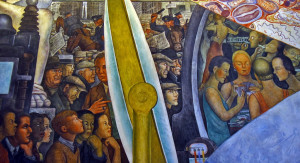To understand why we must understand the context-appropriate definition of the word class.
We are not concerned here with the definition of the word class which describes economic stratification. Dividing the population into quintiles based on income is a useful tool for economic analysis but has no bearing on the subject of a classless society, properly understood.
In fact, even in a fully socialist, classless society these strata will persist. There will still be wealth and income inequality. Even if we imagine a society in which each citizen is given the same basic income allotment, inequality will result. Some will burn through their money before the next check arrives, perhaps borrowing to get through. Others will be frugal, saving or investing their money, accumulating wealth over the long run. Some will be more wise in their investment habits than others, etc..
Economic equality is not a goal or characteristic of the next social formation but the elimination of capitalist class structure must be.

Image courtesy of Payton Chung via flickr
Class, understood in this context, is nothing more or less than one’s relationship to the dominant mode of production. Thus, the capitalist class structure arises directly from the capitalist mode of production. When the capitalist mode of production is revolutionized beyond recognition (beyond its integument ) the structure of capitalist class relations must end.
It is a commonplace now that the capitalist mode of production is about to be superseded by a new, higher mode of production. Call it what you will, the fourth industrial revolution, the second machine age, the rise of the robots, rapidly advancing general-purpose disruptive technologies will inexorably alter the means and relations of capitalist production in the coming decades.
In a time of rapidly spreading technological unemployment familiar social relations of production (i.e. class relations) must come under scrutiny.
In our present capitalist social formation production relations are “the relations among people who are joined by the production process and the antagonistic nexus between those who produce and those who appropriate their surplus labor.” 1
These relations give rise to class relations which extend the nexus to include socio-political power structures and their antagonisms.
Simply put, we have labor and capital, or if you prefer, the proletariat and the bourgeoisie, and the struggle between the two.
When the new means of production effectively take over the function of one of the classes that class loses its position in the production relations nexus. In Marxist terms, when the proletariat becomes the lumpenproletariat what status is left it? What bargaining power does it have — a generalized claim to “social justice”? Obviously, the logic of the capitalist system admits to no such sense of social justice so remediation must be sought in post-market political interventions. Thus, the old class antagonisms persist in perpetuity — or, at least until the conditions are ripe for the next social reformation. An extremely rare opportunity, our opportunity, is tragically squandered.
And how fares the other class if these relations are not challenged? The bourgeoisie, the miniscule percentage of humanity who own the means of production are free to continue the relentless pursuit of their own enlightened self-interests in classic capitalist style. Their power, politically and economically, grows. We must bear in mind that human labor (or robot labor, for that matter) is not the only means of value generation, despite popular misunderstanding. Nature is also a source of value. The planet’s natural resources will continue to be irresponsibly expropriated for the benefit of the elites and to the detriment of all other life. Capitalism 101 rolls on.
The proposal of a universal basic income will do nothing to resolve these class antagonisms if it is understood as a means of redistributing wealth from the owners of capital to a disaffiliated society. This arrangement leaves our existing class structure intact and explains why the dominant class will agree to its adoption (on their terms, of course). It will preserve their privileged position.
In contrast to this is the vision of the classless society — a society in which all stand in the same relation to the mode of production. All are owners; all exercise democratically distributed control. All are represented by the same economic variable, s; all own the surplus value generated.
We no longer divide into antagonistic camps opposed to one another’s economic interests. There are no servants and masters; no wage slaves and their superiors. Economic inequalities will still exist, but our economic interests will all be aligned. “[W]e shall have an association in which the free development of each is the condition for the free development of all.”
Exactly how the process of reappropriation may unfold is a subject for a future post (or, more likely, a series of posts). Suffice it here to say that the capitalist process of development creates the conditions for the end of class antagonism. Open source technologies and near-zero marginal cost production techniques, socialized artificial intelligence and peer-to-peer economies all hint at possible reappropriation measures.
Beyond this lies the question of how a classless society is to be managed. Should it resemble a democracy, a republic, a pluralistic commonwealth, a technocracy or some new form? Fortunately, we’ve an embarrassment of riches in our options.
1 Ellen Meiksins Wood, Democracy Against Capitalism; Renewing Historical Materialism (Verso,2016), pp. 94-5.
Leave a Reply